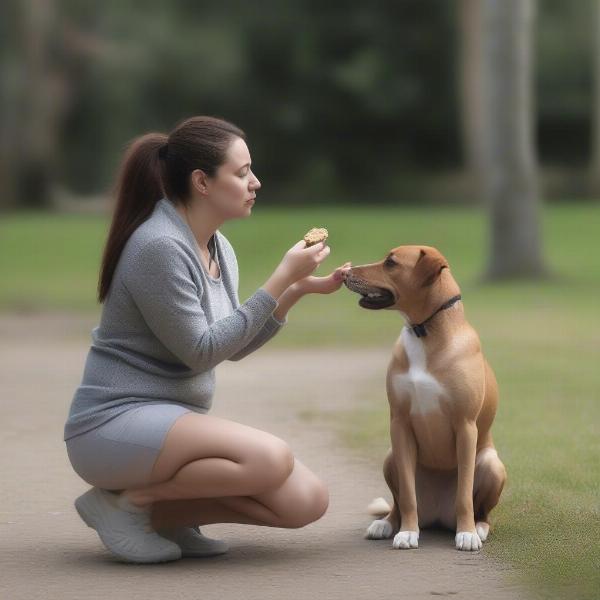Your usually happy-go-lucky canine companion is suddenly acting fearful. They’re cowering, trembling, or hiding for no apparent reason. This sudden shift in behavior can be concerning, and understandably, you’re searching for answers. Let’s explore the potential reasons behind your dog’s newfound fear and discuss how to help them feel safe and secure again. Understanding why your dog is scared all of a sudden is the first step towards providing the support they need.
Fear in dogs can manifest in many ways, from subtle changes like lip licking and yawning to more obvious signs like barking, growling, and even aggression. Recognizing these signals is crucial for addressing the underlying cause of their fear. This sudden onset of fear can stem from a variety of factors, ranging from physical discomfort to psychological distress.
Possible Reasons for Sudden Fear in Dogs
Several reasons can contribute to a dog’s sudden fear. Identifying the root cause is crucial to helping your furry friend.
Physical Discomfort or Illness
Sometimes, fear is a manifestation of pain or illness. Conditions like arthritis, ear infections, or dental problems can cause discomfort, leading to changes in behavior, including fearfulness. If your dog’s fear is accompanied by other symptoms like lethargy, changes in appetite, or whining, it’s essential to consult a veterinarian.
Environmental Changes
A change in environment can be unsettling for dogs. Moving to a new home, the introduction of a new pet or family member, or even rearranging furniture can trigger anxiety and fear. Loud noises like thunderstorms or fireworks are common triggers for fear-related behaviors.
Traumatic Experiences
A negative experience can leave a lasting impact on a dog’s emotional well-being. An encounter with an aggressive dog, being involved in a car accident, or even a seemingly minor incident can lead to sudden fear and anxiety.
Age-Related Changes
Cognitive decline in senior dogs can also manifest as increased fearfulness. As dogs age, their senses may diminish, making them more susceptible to anxiety and confusion in unfamiliar situations.
What to Do If Your Dog Is Suddenly Scared
If your dog is exhibiting sudden fear, it’s essential to approach the situation with patience and understanding. Avoid punishing or scolding them, as this can worsen their anxiety.
Create a Safe Space
Provide your dog with a safe, quiet space where they can retreat when feeling overwhelmed. This could be a crate, a dog bed in a quiet corner, or even a closet. Make the space comfortable and inviting with familiar blankets and toys.
Identify and Minimize Triggers
If possible, identify and minimize the triggers causing your dog’s fear. If loud noises are the culprit, try creating a calming environment with white noise or calming music. If your dog is fearful of a specific object or person, gradually desensitize them through positive reinforcement and counter-conditioning techniques.
Seek Professional Help
If your dog’s fear is severe or persistent, consult a veterinarian or a certified dog trainer or behaviorist. They can help you develop a tailored plan to address your dog’s specific needs, which may include medication or behavior modification techniques.
Building Confidence and Reducing Anxiety
Building your dog’s confidence is crucial for overcoming fear. Positive reinforcement training, combined with desensitization and counter-conditioning, can help your dog associate previously fearful stimuli with positive experiences.
Positive Reinforcement Training
Reward your dog with treats, praise, or toys when they exhibit calm and relaxed behavior in potentially stressful situations. This helps build their confidence and reinforces positive associations.
Desensitization and Counter-Conditioning
Gradually expose your dog to the source of their fear at a low intensity, rewarding them for calm behavior. Over time, slowly increase the intensity of the stimulus while continuing to reward positive responses. This process helps your dog learn to associate the previously fear-inducing stimulus with something positive.
 Dog participating in training
Dog participating in training
Conclusion
A sudden onset of fear in your dog can be distressing for both you and your pet. By understanding the potential causes and employing appropriate strategies, you can help your dog overcome their fear and regain their confidence. Remember, patience, consistency, and professional guidance are key to helping your furry friend feel safe and secure once again. If your dog is scared all of a sudden, don’t hesitate to seek help. Your dog’s well-being is worth the effort.
FAQ
- My dog is suddenly scared of everything. What should I do? Consult a veterinarian to rule out any underlying medical conditions and then seek the help of a certified dog trainer or behaviorist.
- How can I tell if my dog is in pain? Look for signs like limping, whining, changes in appetite, and increased aggression or fearfulness.
- Can thunderstorms cause anxiety in dogs? Yes, loud noises like thunderstorms are common triggers for anxiety in dogs.
- Is it too late to help an older dog with fear issues? No, it’s never too late to help a dog with fear issues. Consult a professional for guidance.
- What are some calming techniques for scared dogs? Creating a safe space, using calming music, and practicing gentle massage can help soothe a scared dog.
- How can I make my dog feel safe? Provide a consistent routine, positive reinforcement, and a safe, comfortable environment.
- Can medication help dogs with anxiety? In some cases, medication can be helpful in conjunction with behavior modification techniques. Consult your veterinarian.
You Might Also Like
- dog suddenly scared of something in house
- lost of dog
- dog bites veterinarian
- how to keep dogs from peeing on furniture
ILM Dog is a leading international dog website dedicated to providing expert advice and resources on all aspects of dog care and well-being. From breed selection and puppy care to senior dog health and training tips, ILM Dog offers a wealth of information to help dog owners provide the best possible care for their canine companions. We specialize in breed information, health & medical advice, training, nutrition, grooming, and product recommendations. Contact us for expert advice and support: [email protected] or +44 20-3965-8624.